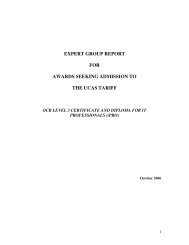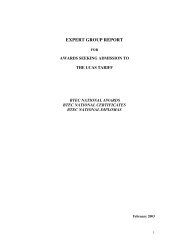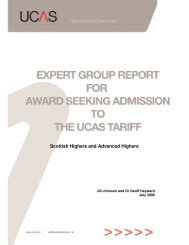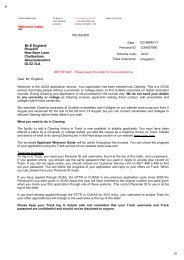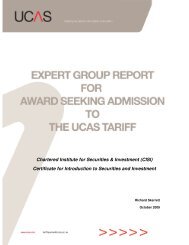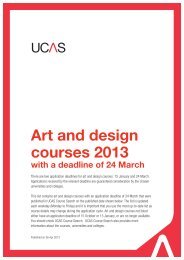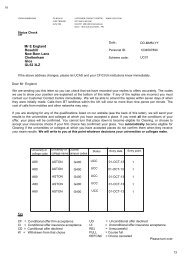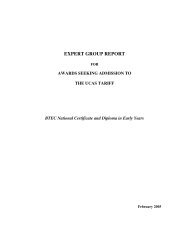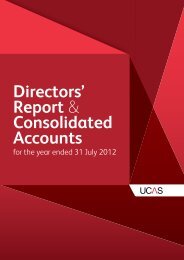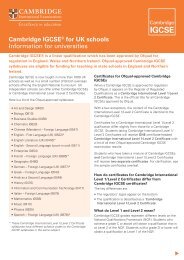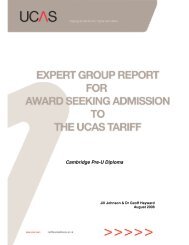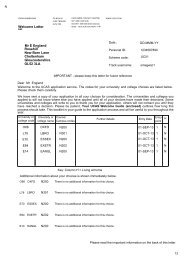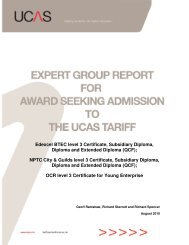International qualifications 2013 (pdf) - CUKAS
International qualifications 2013 (pdf) - CUKAS
International qualifications 2013 (pdf) - CUKAS
Create successful ePaper yourself
Turn your PDF publications into a flip-book with our unique Google optimized e-Paper software.
Qualifications currently offered<br />
See also Overseas Examinations of UK Awarding Organisations<br />
(Appendix A).<br />
GRADING SYSTEM<br />
SEC: 1 – 7 with Un as unclassified<br />
MC: A – E pass grades with F as fail<br />
EDUCATION SYSTEM<br />
Pre-school provision in Malta starts at age three and is attended<br />
by around 98% of the cohort. Compulsory primary education<br />
begins at age five, continuing for six years.<br />
State secondary education follows in two types of school – Junior<br />
Lyceum, which has a qualifying examination for entry, or<br />
Secondary School, with no qualifying entrance requirements. Both<br />
school types have a five-year course of general education,<br />
divided into a first cycle of common curriculum, followed by a<br />
second cycle of common core and optional subjects. There is no<br />
vocational orientation in compulsory education. After completion<br />
of Form V, at age 16, all pupils sit the Secondary Education<br />
Certificate. This is offered by the MATSEC Board of the University<br />
of Malta. Since 2000, this consists of two papers – Paper I is a<br />
core paper, Paper II has A and B options for different abilities.<br />
The Matriculation Certificate Examination is offered in the<br />
University of Malta Junior College, the Higher Secondary School<br />
and non-state Sixth Forms and on condition of six passes at SEC<br />
or six GCE O Level passes in specified subjects. The Matriculation<br />
Certificate Examination covers a package of subjects from both<br />
the humanities and the science areas. Candidates offer six<br />
subjects in all, two of which must be at advanced level, and three<br />
at intermediate level, in addition to ‘Systems of Knowledge’. Each<br />
subject is graded separately, as well as an overall grade awarded<br />
as an average of all six subjects. Medium of instruction are<br />
English and Maltese.<br />
ACCESS TO HIGHER EDUCATION<br />
The University of Malta is Malta’s only HEI. The main entry<br />
qualification is the Matriculation Certificate.<br />
Further requirements are Maltese, English and mathematics in<br />
the SEC at grade 5 or better. Some courses may have additional<br />
special requirements. Bachelor’s degrees last for three years<br />
(ordinary degree) and four years (honours). Medicine is a fiveyear<br />
course and law six years. Master’s degrees are of two years’<br />
duration following a three-year first cycle degree and one year<br />
preceded by an honours degree. PhD studies last for three to six<br />
years.<br />
Mauritius<br />
EVALUATION<br />
Cambridge School Certificate<br />
Generally considered to be comparable to GCSE grade C or above<br />
Cambridge Higher School Certificate<br />
Generally considered to be comparable to GCE Advanced level<br />
EDUCATION SYSTEM<br />
There is universal provision of primary education for six years<br />
(called Standard I – VI). Promotion is automatic, the only standard<br />
which can be repeated being standard VI. The six years of<br />
primary education culminates in the national Certificate of<br />
Primary Education (CPE) examination, which serves as a selection<br />
tool for entrance at secondary level, with only those passing the<br />
CPE being allowed access to secondary schools. Primary<br />
education was made compulsory in 1990.<br />
Since 2005, education has been compulsory up to the age of 16<br />
in Mauritius. The current transition rate from primary to<br />
secondary is about 65%. There are consequently a sizable<br />
number of the 27,000 annual CPE candidates who do not<br />
succeed and need to re-sit the examination. Further to this re-sit,<br />
there are still some 3500 children annually who do not succeed<br />
in the CPE. These double failures are not allowed entrance to<br />
mainstream secondary schooling but instead are channelled to<br />
the prevocational schooling where both remedial and prevocational<br />
education are carried out for three years, after which<br />
the students can join the vocational sector. They can later join the<br />
world of work, seek apprenticeship or follow further trade training<br />
programmes. Several measures have, however, been introduced<br />
to improve the pass rate at CPE, including the development of an<br />
enhancement programme at Standard IV level to better prepare<br />
students to schooling at upper primary level.<br />
There are two main national examinations in the secondary<br />
school system in Mauritius. These examinations are co-prepared<br />
by the Mauritius Examinations Syndicate and Cambridge<br />
<strong>International</strong> Examinations, UK. Students are awarded the<br />
Cambridge School Certificate at the end of five years of<br />
secondary schooling, and after two additional years can sit for the<br />
Cambridge Higher School Certificate.<br />
ACCESS TO POST SECONDARY AND HIGHER EDUCATION<br />
There is currently a growing demand for post-secondary and<br />
tertiary education with more students sitting for O and A levels in<br />
Mauritius. As a result, more places have been provided for post<br />
secondary schooling in both the public and private sectors.<br />
Admission for a place in the public-funded institutions, more<br />
particularly the two public universities (UoM and UTM), is<br />
competitive. Although the admission requirement for<br />
undergraduate courses is a pass at A level in the fields of study,<br />
applicants usually need to have at least a grade aggregate at<br />
HSC of 22 (A=10 points; B=8; C=6; D=4; & E=2) for securing<br />
entrance, especially in the high demand management, IT and<br />
engineering sectors.<br />
Admission requirements at postgraduate and PhD levels are<br />
similar to those in the UK, namely respectively a good degree or<br />
master’s in the requested area of study.<br />
There is an increasing number of private providers in tertiary<br />
education offering programmes complementing the existing offer<br />
in the public sector, with a new regulatory framework in place for<br />
the setting up of private universities.<br />
Efforts have also recently been focused on the development of<br />
the TVET sector with an increase in the number of programmes<br />
and intake of students at the level of Higher National Diplomas,<br />
and it is expected that more programmes will be developed in<br />
sectors where there is a growing demand in the local industry<br />
and the world of work. The setting up of an Open University is<br />
also envisaged, with the aim of further developing access to<br />
tertiary education through distance education channels.<br />
Mexico<br />
EVALUATION<br />
Bachillerato General<br />
Considered comparable to at least GCSE standard (grades A, B,<br />
C) on a subject for subject basis (except English language).<br />
Bachillerato Tecnológico<br />
Considered comparable to BTEC First Diploma /N(S)VQ Level 2.<br />
INTERNATIONAL QUALIFICATIONS 41



